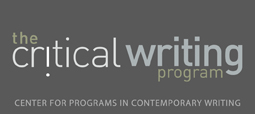Health Care Management
An Overview of the Discipline
Health care economists in the discipline of health care management discuss and debate the policies surrounding the current health care system in the United States and around the world. The Health Care Management Department at the Wharton School defines the discipline as "thinking related to the business, management, policy of health care services, health care techonology, and health care financing."
Through articles in scholarly journals, empirical studies using extensive analytical modeling, and opinion pieces seen in newspapers worldwide, health care management writing extends over a large readership. Subdisciplines include industrial organization, health economics, public economics, applied microeconomics, and behavioral economics.
Writing in the Discipline
Goals
Writing in the discipline of health care management looks to provide information to the average consumer about healthcare policies being implemented by either the government or private authorities. This is done through either an affirmation or critique of current policies and is seen through the lens of empirical studies or scholarly opinion pieces. Authors should also consider the effects of these policies on the daily lives of consumers.
Reasoning
Explanatory and justificatory reasoning both have key roles in writing in healthcare management. For writing that shows the consumer the benefits and drawbacks of policy, such as in an opinion piece, justificatory reasoning is a sound way for the author to showcase his or her viewpoint. However, in works where the author is trying to simply show the effects of a policy or explain the results of a health care study, explanatory reasoning is used to reach the reader.
Evidence
Both quantitative and qualitative data are key in discussing health care policy. Quantitative data may measure the number of consumers who use a certain health policy, while qualitative data surveys those consumers to understand their opinions or thoughts about policy. Appropriate evidence for writing for health care management should either come from published studies or experiments. It should be used often in writing that is explaining to consumers the effects of a policy and in writing that looks to further explore data or make inferences based on studies.
Authorship
The writing process may be collaborative or written by a single author. Often, an individual will begin the research process and write the first draft of a paper or essay before involving a group of peers who both review and add to the piece. Authors who added research or analysis to a piece of writing are included as co-authors. Thus, many articles published in healthcare management journals are written by two, three, or even more, co-authors.
Claims
Health care writing is based entirely on data taken from surveys and observations of consumers. Therefore, the author must be careful that his or her claims line up with already accepted standards in the health care world, that the claims are supported by reliable data from a reputable source, and that other experts in the field would not be able to immediately reject the interpretation or presentation of a policy due to a misinterpretation of the primary data.
Writing Tips
Writing in healthcare management needs to balance being appropriately technical in explanation while still being useful and informative to consumers who do not necessarily understand the technicalities of the health care system. The writing uses a specialized vocabulary that deals with policy and health care terms. In addition, the author should be careful that the style is straightforward and that the writing is targeted towards the appropriate audience, the consumers affected by policy, or experts debating the merits of health care policy.
Common Errors
Common errors found in health care writing include a lack of invention and relying too heavily on past research and data during analysis. Healthcare management is constantly looking for new applications and implications for policy, so it is important that a piece of writing showcases new ideas. Other common errors include improper citations and faulty grammar and mechanics.
Style Preferences
The writer should use simple, straightforward, concise phrases when writing a health care piece. A plain, academic style is preferred in both explanatory and justificatory genres in this field. While persuasive language and tone may be helpful in a justificatory piece looking to change an audience's mind, explanatory pieces should avoid any language that might bias the work.
Important Criteria for Student Writing
Professors ranked the originality of ideas, the mastery of other's ideas, organization, and articulation as the most important features of student writing in the healthcare management. Of secondary importance are grammar and mechanics as well as following citation practices because "while grammar and citations are necessary, in the end, it is the strength of original ideas and clear organization that makes the writing interesting and useful to the discipline as a whole."
Genre
Genres of healthcare management writing include scholarly articles published in journals and editorials published in magazines and newspapers.
Scholarly articles can be either justificatory or explanatory in nature, as they variously aim to discuss, debate, or explain a type of policy to an audience of other scholars in the field. These articles are published quarterly or semi-annually in journals which are accesible to both professors and experts in the field. Often times, an article will have multiple co-authors who have collaborated on the research process.
Example of a Scholarly Journal of Healthcare ManagementEditorials are primarily justificatory in nature because they explain the advantages or disadvantages of a policy for the consumer. The audience for an editorial is usually the average reader, therefore the writer must be careful about using vocabulary and giving reasons which can logically be understood. These pieces usually have single authors, as they are personal responses to the work done by other experts in the field. Most major newspapers will run these pieces as well as any magazines or reviews focused on the health care industry.
Example of a Healthcare Management EditorialAdditional Resources
Helpful Links
Wharton Healthcare Management DepartmentSage Journal of Health Management
© 2013 The University of Pennsylvania
Meet the Professors

Dr. Amanda Starc
Amanda Starc is an assistant professor at the Wharton School's Healthcare Management Department who teaches both graduate and undergraduate courses. Professor Starc has published articles in health economics journals, including the American Economic Review.
More...
Dr. Jonathan Kolstad
Jonathan Kolstad is an assistant professor at the Wharton School's Healthcare Management Department. He has published articles in journals such as the Quarterly Journal of Economics and the Journal of Health Economics.
More...